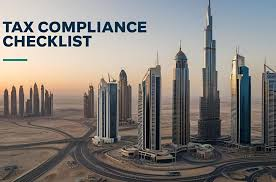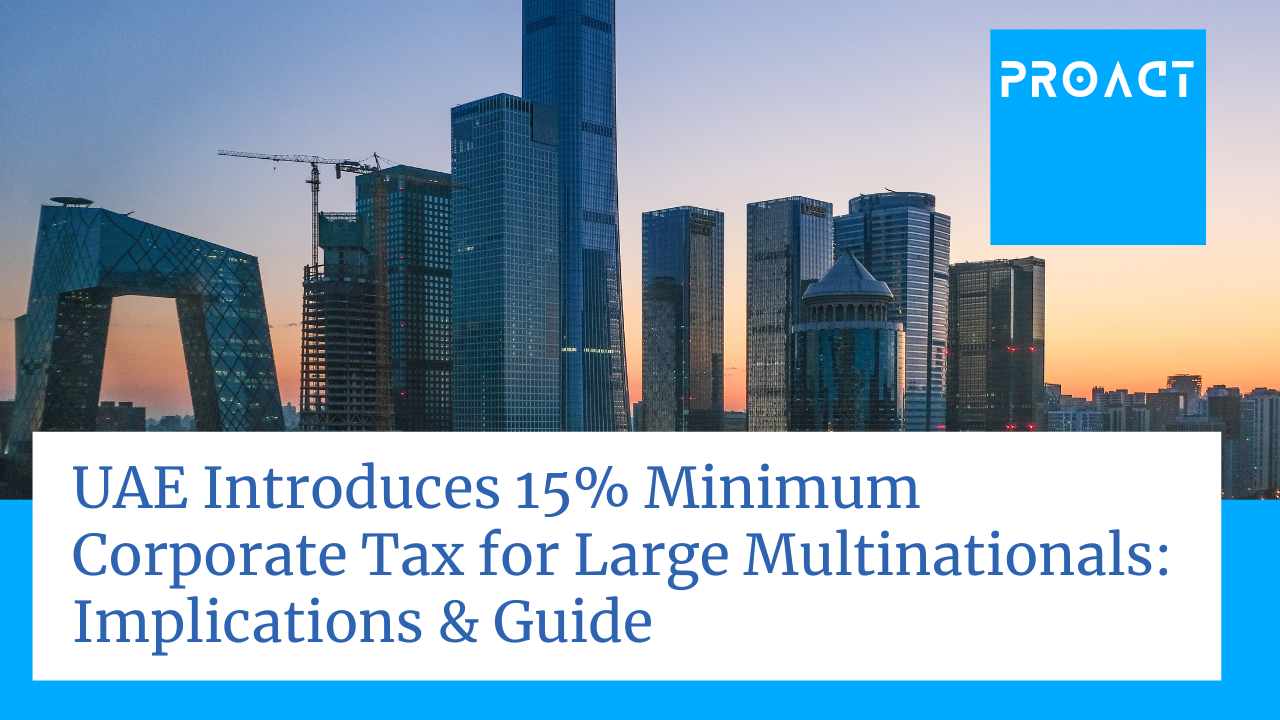Now Reading: Navigating Corporate Tax Compliance in the UAE: Key Deadlines and Requirements for 2025
-
01
Navigating Corporate Tax Compliance in the UAE: Key Deadlines and Requirements for 2025
Navigating Corporate Tax Compliance in the UAE: Key Deadlines and Requirements for 2025

Table of Contents
The United Arab Emirates (UAE) introduced its federal Corporate Tax (CT) regime under Federal Decree-Law No. 47 of 2022, effective for financial years starting on or after June 1, 2023. With a standard rate of 9% on taxable income above AED 375,000 and 0% below, the UAE maintains a competitive tax environment. Additionally, a Domestic Minimum Top-up Tax (DMTT) of 15% for multinational enterprises (MNEs) with global revenues exceeding €750 million takes effect from January 1, 2025, aligning with the OECD’s Pillar Two framework.
As businesses adapt to these changes, compliance with registration, filing, and record-keeping requirements is critical to avoid penalties, particularly with key deadlines in 2025. This guide outlines the essential requirements, deadlines, exemptions, and strategies for navigating UAE corporate tax compliance, with insights from Sharjah’s business-friendly policies as a comparative model.
1. Corporate Tax Framework in the UAE (2025)

Tax Rates and Scope
- Standard Rate: 0% on taxable income up to AED 375,000; 9% on income above this threshold, applicable to all businesses unless exempt.
- Domestic Minimum Top-up Tax (DMTT): 15% for MNEs with consolidated global revenues of €750 million or more in at least two of the four preceding financial years, effective for financial years starting on or after January 1, 2025.
- Taxable Entities:
- Exempt Entities (subject to conditions):
- Government entities and government-controlled entities.
- Businesses engaged in natural resource extraction (subject to Emirate-level taxes).
- Qualifying public benefit entities, investment funds, and pension funds.
- Qualifying Free Zone Persons (QFZPs) meeting regulatory requirements and not conducting business with mainland UAE.
- Small Business Relief: Businesses with revenues below AED 3 million for tax periods ending on or before December 31, 2026, are exempt from CT and face simplified compliance (e.g., reduced transfer pricing rules).
Key Compliance Requirements

- Registration: All taxable persons must register with the Federal Tax Authority (FTA) via the EmaraTax portal, even if exempt or below the AED 375,000 threshold. Separate registration from VAT is required.
- Filing: Annual CT returns must be filed within 9 months of the financial year-end, with payment due concurrently.
- Record-Keeping: Maintain financial statements per International Financial Reporting Standards (IFRS) for 7 years post-tax period. Audits are mandatory if revenue exceeds AED 50 million or for QFZPs.
- Transfer Pricing (TP): Related-party transactions must adhere to the arm’s-length principle, with TP documentation required. Small businesses under relief have simplified TP rules.
- Financial Statements: Prepared on an accrual basis (cash basis allowed if revenue ≤ AED 3 million or via FTA approval).
Comparison to Sharjah
- Sharjah’s Business Environment: Sharjah’s free zones (e.g., Sharjah Media City, Sharjah Publishing City) offer 0% CT for QFZPs, similar to Dubai’s free zones, but with lower setup costs (e.g., AED 5,750–11,500 vs. Dubai’s AED 10,000–20,000). Sharjah’s focus on SMEs aligns with UAE’s Small Business Relief, fostering compliance ease.
- Advantages: Sharjah’s streamlined licensing and lower fees reduce compliance costs, but Dubai’s broader freehold zones and global hub status attract larger MNEs, increasing DMTT relevance.
2. Key Deadlines for 2025

Registration Deadlines
- Natural Persons: Must register by March 31, 2025, to rectify errors or update records without penalties.
- Juridical Persons: Deadlines vary based on trade license issuance month, per FTA Decision No. 3 of 2024 (effective March 1, 2024). For licenses issued in:
- January/February: Register by May 31, 2024 (past; ensure compliance if missed).
- March/April: Register by June 30, 2024 (past; rectify by March 31, 2025).
- May/June: Register by August 31, 2024 (past; rectify by March 31, 2025).
- July/August: Register by October 31, 2024 (past; rectify by March 31, 2025).
- September/October: Register by December 31, 2024 (past; rectify by March 31, 2025).
- November/December: Register by February 28, 2025.
- No License: Register by March 31, 2025.
- Non-Resident Persons with PE: Register within 9 months from PE existence (e.g., PE from December 1, 2023, requires registration by September 1, 2024).
- Penalty for Late Registration: AED 10,000; waived if registered and returns filed by March 31, 2025.
Filing and Payment Deadlines
- Financial Year Ending December 31, 2024: File CT return and pay tax by September 30, 2025.
- Financial Year Ending May 31, 2024: File by February 28, 2025.
- DMTT Compliance: For MNEs, file DMTT returns and disclose impacts in FY 2025 financial statements (interim or final). FY 2024 statements must note DMTT enactment.
- Penalty for Late Filing: Fines escalate with delay duration (e.g., AED 10,000 for late submission, higher for non-filing or inaccuracies).
Other Deadlines
- Tax Residency Certificate (TRC): Apply via EmaraTax for 2025 to claim double tax treaty benefits (over 100 countries). Deadlines vary; apply early to avoid delays.
- Small Business Relief: Elect relief for tax periods ending by December 31, 2026, ensuring revenue ≤ AED 3 million.
3. Key Requirements for Compliance
Documentation
- Financial Statements: Include profit and loss, balance sheets, and cash flow statements per IFRS.
- Taxable Income Calculations: Adjust for allowable deductions (e.g., depreciation, bad debts) and exemptions.
- Transfer Pricing Documentation: For related-party transactions, maintain records proving arm’s-length pricing.
- Exemption Claims: Provide evidence for exemptions (e.g., QFZP status, small business relief).
- Additional Records: Depreciation schedules, intra-group transaction details, and audit reports (if applicable).
Registration Process
- Steps:
- Non-Residents: Assess PE or nexus status; register if applicable.
- Support: Firms like Emirates Business Setup or Hawksford can assist with registration and compliance.
Filing Process
DMTT Compliance
- Scope: Applies to MNEs under Pillar Two rules, ensuring a 15% minimum effective tax rate on UAE-sourced profits.
- Requirements:
- Challenges: Complex data requirements; engage consultants for accuracy.
4. Challenges and Mitigation Strategies
Challenges
- Registration Confusion: Businesses often assume VAT registration covers CT, leading to missed deadlines.
- Free Zone Ambiguities: QFZPs must register and file returns despite 0% CT, causing compliance oversights.
- DMTT Complexity: MNEs face intricate data and disclosure requirements, with FY 2024 statements needing DMTT enactment notes.
- Penalties: Late registration/filing incurs AED 10,000 fines; inaccuracies or non-filing attract higher penalties.
- Record-Keeping: Maintaining IFRS-compliant records for 7 years is resource-intensive for SMEs.
Mitigation Strategies
- Engage Professionals: Use firms like Emirates Business Setup, Hawksford, or Tulpar Global Taxation for registration, filing, and DMTT compliance.
- Tax Calendar: Create a 2025 calendar with deadlines (e.g., February 28 for May 31 FY, September 30 for December 31 FY). Set reminders for March 31 natural person registration.
- Monitor FTA Updates: Subscribe to FTA notifications and circulars via EmaraTax to clarify ambiguities (e.g., VAT vs. CT registration).
- Leverage Small Business Relief: SMEs with ≤ AED 3 million revenue should elect relief by December 31, 2026, simplifying compliance.
- PropTech Tools: Use accounting software (e.g., QuickBooks, Xero) for IFRS-compliant records and automated tax calculations, as adopted by Sharjah’s SMEs.
- Sharjah’s Model: Emulate Sharjah’s low-cost free zone compliance (e.g., streamlined licensing at AED 5,750) by prioritizing cost-efficient setups in Dubai’s free zones for QFZPs.
5. Taxation in Context of Short-Term Rentals
- Corporate Tax Applicability:
- VAT (5%): Applies to serviced apartments or commercial short-term rentals; standard residential rentals are exempt.
- Holiday Homes Permit: Register with the Department of Economy and Tourism (DET) (AED 1,520/year) and pay Tourism Dirham (AED 10–30/bedroom/month), deductible as business expenses for CT.
- Compliance Strategy: Maintain separate records for rental income, DET fees, and VAT to streamline CT and VAT filings, leveraging Sharjah’s regulated holiday home model for efficiency.
6. Recommendations for 2025 Compliance
- Immediate Actions (Q1–Q2 2025):
- Register by Deadlines: Ensure compliance by February 28, 2025 (November/December licenses) or March 31, 2025 (natural persons, no license). Rectify past misses by March 31 to avoid AED 10,000 penalties.
- File Early: For FY ending May 31, 2024, file by February 28, 2025; for December 31, 2024, prepare for September 30, 2025.
- Example: A Dubai-based SME with a December 2024 FY and AED 2 million revenue should register by March 31, 2025, elect Small Business Relief, and file by September 30, 2025, avoiding CT.
- MNEs and DMTT:
- Action: Assess DMTT applicability (revenue ≥ €750 million), disclose in FY 2025 statements, and file DMTT returns. Engage consultants for GloBE compliance.
- Example: A multinational in DIFC with €800 million global revenue must file DMTT returns in 2025, ensuring a 15% effective tax rate on UAE profits.
- SME and Free Zone Strategies:
- Action: SMEs should claim Small Business Relief (≤ AED 3 million revenue) by December 31, 2026. Free zone businesses (e.g., Sharjah Media City, Dubai Multi Commodities Centre) should verify QFZP status to maintain 0% CT.
- Example: A Sharjah free zone rental operator with AED 2.5 million revenue can claim relief, simplifying TP and filing by September 30, 2025.
- Operational Excellence:
- Sharjah as a Model:
Conclusion
Navigating UAE corporate tax compliance in 2025 requires adherence to Federal Decree-Law No. 47 of 2022, with a 9% CT rate above AED 375,000 and a 15% DMTT for MNEs from January 1, 2025. Key deadlines include March 31, 2025, for natural person registration, February 28, 2025, for May 31 FY filings, and September 30, 2025, for December 31 FY filings.
Businesses must register via EmaraTax, maintain IFRS-compliant records for 7 years, and comply with TP rules, with SMEs benefiting from Small Business Relief (≤ AED 3 million revenue). Challenges like registration confusion and DMTT complexity can be mitigated by engaging professionals, using PropTech, and monitoring FTA updates. Drawing from Sharjah’s cost-efficient free zone model, businesses can optimize compliance by leveraging exemptions and streamlined processes, ensuring success in the UAE’s competitive tax landscape.
WATCH MORE: https://www.youtube.com/watch?v=ugljd5_zf-k
READ MORE: Understanding the UAE’s 15% Corporate Tax for Multinationals in 2025






















